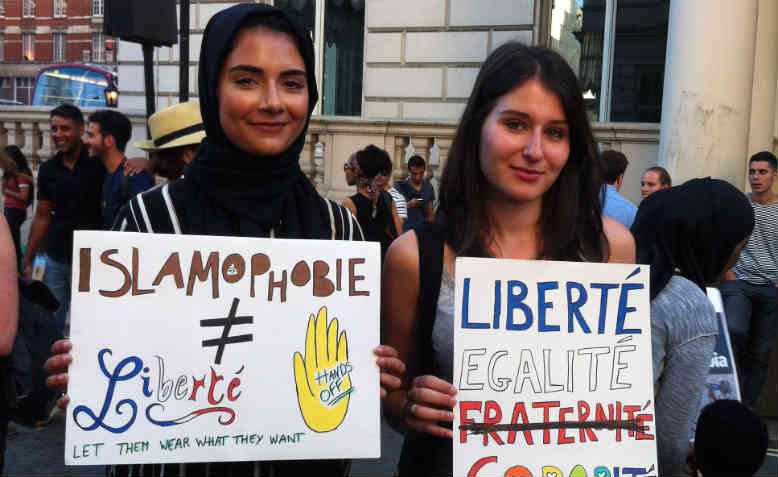 Zaynab and Melanie, two protestors at the French embassy on Friday. Photo: Katherine Connelly
Zaynab and Melanie, two protestors at the French embassy on Friday. Photo: Katherine Connelly
Friday night’s central London emergency protest shows how Islamophobia must be countered, reports Katherine Connelly
There have now been two days of protest outside the French Embassy in outrage at photographs which showed armed police forcing a Muslim woman to remove some of her clothing on a beach in Nice.
On Thursday protesters staged a ‘wear what you want’ beach party outside the Embassy. On Friday evening an emergency protest called by Stand Up To Racism attracted several hundred.
Speakers that included teachers and nurses as well as representatives of the University and College Union, LGBT Against Islamophobia, Stand Up To Racism and Unite Against Fascism, denounced this latest action as an Islamophobic attack on women and their right to choose what they wear.
While this is only the latest in a long series of attacks by the French authorities on Muslims, and particularly Muslim women, many speakers warned that a similar Islamophobic agenda lies at the heart of the British government’s Prevent programme and stressed the importance of building opposition to this.
There was a clear feeling on the protest that the French authorities’ claim to be defending ‘secularism’ were nothing more than a cover for racism. Charlie told Counterfire that she felt it was important to attend the protest out of solidarity with other Muslims, adding “The government says it’s pushing secuarlism, but it’s really not when it’s only attacks on one particular group. They’ve banned the veil, they’ve banned the hijab in schools.” Melanie, who is from the South of France and has family in Nice, said that she can understand that people are afraid but “fear can’t be used to validate racist views.”
Other protesters highlighted the sexism behind this attack. Rabia said “This represents the way that throughout history women’s bodies have been used as a medium of oppression.” Zaynab dismissed claims this had anything in common with women’s rights, explaining women’s rights are about empowering women to decide for themselves what they wear, adding that women have a history of standing up for their rights. This was something Melanie echoed, saying women should be allowed the right to choose whether they wear “Bikinis or burqinis”.
The French courts have today suspended the ‘burqini ban’ which only demonstrates the importance of keeping up the pressure on the authorities and showing this law for what this is – racist and sexist and something we are not going to stand by and watch happen.

